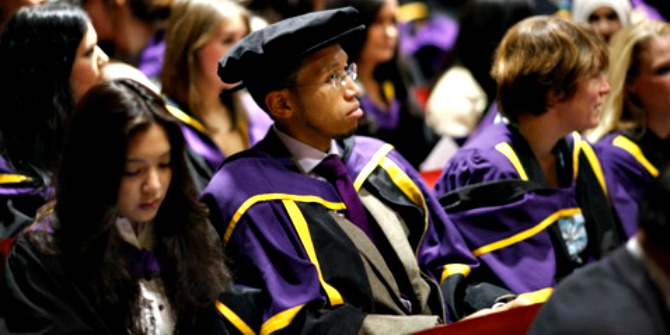This an excellent, thoughtfully-produced pragmatic guide to the very fine and complicated art of doctoral supervision across cultures, writes Casey Brienza.
 Enhancing the Doctoral Experience: A Guide for Supervisors and Their International Students. Steve Hutchinson, Helen Lawrence, and Dave Filipović-Carter. Gower/Ashgate. 2014.
Enhancing the Doctoral Experience: A Guide for Supervisors and Their International Students. Steve Hutchinson, Helen Lawrence, and Dave Filipović-Carter. Gower/Ashgate. 2014.
It was with tremendous anticipation that I received Enhancing the Doctoral Experience: A Guide for Supervisors and Their International Students for review. My interests, personal and professional, in the subject are twofold: Firstly, I used to be an international student myself, and the first time I ever left my home country to study for a degree abroad was as an American undertaking a PhD at the University of Cambridge (which, my fellow Americans, is in England, not Massachusetts). Now, though, the shoe is on the other foot, and I hold a permanent academic post at a doctoral-granting institution in the United Kingdom, so supervising PhD students is a part of the job description. Would this book reflect truthfully upon my own experiences while shining an illuminating light upon an area of teaching for which, I am not afraid to admit, I feel woefully under-prepared for, in a system of higher education I still do not fully understand?
On the face of things, the authors of this book, Steve Hutchinson, Helen Lawrence, and Dave Filipović-Carter, do not seem to be the most ideally positioned to be writing anything authoritative on this topic. Although all three hold PhDs (in zoology, sociolinguistics, and international law, respectively), none of them supervise PhD students. However, they assert, in their careers as freelance development consultants to academics and other researchers, each has met thousands of international research students, many of whose studies were troubled by various aspects of their relationships with their doctoral supervisors. A book on the subject ought to be useful, they concluded. It would be difficult to disagree.
In fact, a modicum of distance from the day-to-day practice of doctoral supervision may have been an asset. Often, the things closest to us are the hardest to see with clarity. Drawing upon cognitive and managements theories and a diverse range of empirical data, including survey questionnaires, interviews with researchers at a range of career stages, and even, at times, just ‘asking a roomful of international research students to write a piece of advice on a sticky note for a new doctoral student from their own country,’ Enhancing the Doctoral Experience painstakingly deconstructs every conceivable aspect of interpersonal interaction between supervisor and supervisee likely to occur in the context of a British doctoral education. Applicable frameworks for relationship development and pragmatic advice for making it all work across cultures and potentially language barriers are then provided in abundance throughout.
The book is organized, roughly speaking, into thirteen chapters which can be further divided into five parts. The first introduces the UK doctorate and what makes it distinctive. The second explores international students’ motivations for wanting to do a doctorate in the UK and what they are likely to expect as a consequence. The third focuses on how to start off right and build an effective relationship with one’s student. The fourth consists of six chapters, one for each of the so-called ‘Dublin Descriptors’ of competencies that students who have completed a PhD must demonstrate at the end of their course. These chapters range widely, from advice about how to guide students through a review of the existing literature to working on public outreach and impact. The fifth and final section provides advice for preparing for the viva.

There are so many suggestions, visualizations, and practical exercises presented here about every conceivable angle of interaction between supervisor and student, at every stage of the relationship, that reading this book in one go to learn how to be a good (or better) supervisor, as I did, is probably not advisable. The amount of information might easily become overwhelming. Instead, the book’s greatest utility, in my view, is as a targeted how-to manual, to be consulted when running into trouble or, ideally, before one begins to tinker and fiddle with unfamiliar parts of the proverbial machine. The onus of effective doctoral education rests far more heavily on the shoulders of an individual supervisor in the British system than it does in some others, such as that of the United States, where it’s generally assumed to take a village—or an entire department of academic staff—to raise a PhD. There were all too many potential issues which, despite having been a UK PhD student myself, I probably would not have considered on my own as part of a supervisor’s remit.
In fact, the book’s greatest strength, its level of detail, is also its greatest weakness. Although the title does not make it explicit, it must be made absolutely clear: Enhancing the Doctoral Experience is about enhancing the doctoral experience in the UK,where doing a PhD is, with some exceptions, narrowly equated to doing an 80,000-word thesis. Thus, in spite of a wealth of material about advising international students in their writing and research, there was little, say, about advising international students about preparing for the next stage of their careers or applying for academic jobs. Not a word, even, on how to write good reference letters! I was also saddened by the authors’ seemingly unquestioned acceptance of the premise that the student would be paying hugely, either in actual cash terms, or through indirect opportunity costs, for their degree certificate and that part of the raison d’être for improving supervisory provision was providing better value for money. The authors’ default assumption seemed to be that these international students would come to the UK and then, upon receipt of their PhD, they would head back home. I speak from personal experience here: That ain’t always true.
Nevertheless, this an excellent, thoughtfully-produced pragmatic guide to the very fine and complicated art of doctoral supervision across cultures. Its focus on each and every conceivable aspect of the production of a thesis, in particular, is invaluable. I am sure that I will be returning to Enhancing the Doctoral Experience frequently in years to come for advice and tips on making the PhD process a successful and mutually beneficial endeavour. Recommended.
Casey Brienza is a sociologist and Lecturer in Publishing and Digital Media at City University London’s Department of Culture and Creative Industries. She holds a first degree from Mount Holyoke College, an MA in Media, Culture, and Communication from New York University, and a PhD in Sociology from the University of Cambridge. Her doctoral thesis, titled ‘Domesticating Manga: Japanese Comics, American Publishing, and the Transnational Production of Culture,’ and is currently being revised into a book manuscript. Casey also has refereed articles in print or forthcoming in International Journal of Cultural Policy, Journal of Popular Culture, Studies in Comics, and more. She may be reached through her website. Read more reviews by Casey.








2 Comments